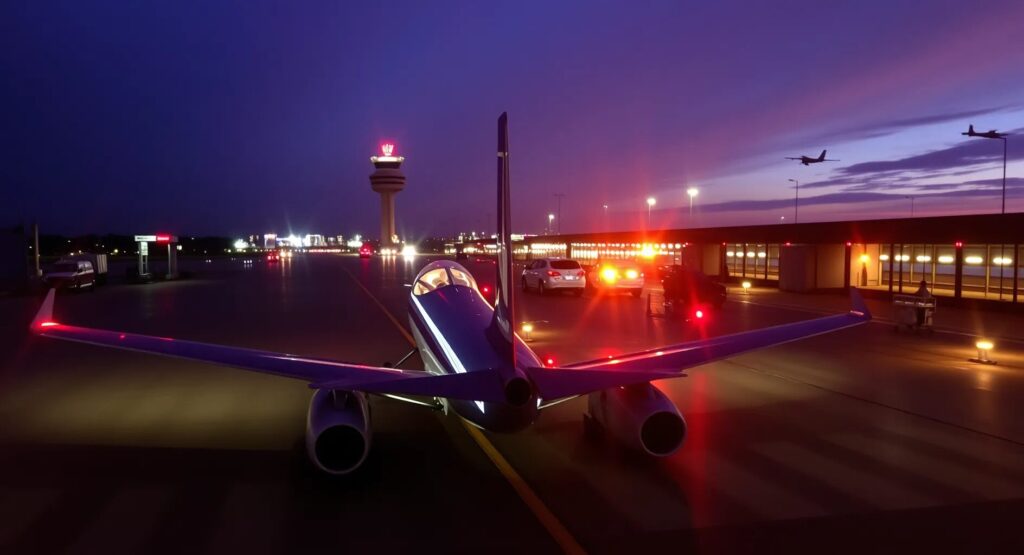
The aviation industry has always prioritized safety and efficiency. As technology advances, Artificial Intelligence (AI) has emerged as a powerful tool to meet these priorities. One of the most promising applications of AI in aviation is predictive maintenance. This approach is transforming how airlines maintain their aircraft, preventing unexpected failures and significantly enhancing safety.
The Role of AI in Predictive Maintenance
AI-driven predictive maintenance involves the use of advanced algorithms and machine learning models to analyze vast amounts of data from aircraft systems. These models can predict when a component is likely to fail, allowing maintenance teams to address issues before they cause problems. This is a proactive approach, in contrast to traditional maintenance, which is often reactive and performed after a fault has been detected.
Sensors embedded in various parts of the aircraft continuously monitor parameters like engine performance, temperature, and vibration levels. This data is fed into AI models that compare current readings with historical data, identifying patterns that suggest potential failures. By predicting these failures before they occur, airlines can schedule maintenance during routine checks, avoiding costly and dangerous in-flight malfunctions.
Enhancing Operational Efficiency
The impact of AI on airline operational efficiency is profound. By predicting maintenance needs accurately, airlines can reduce unexpected downtime, which is a significant cost factor in the industry. Unscheduled maintenance can lead to delays, cancellations, and even rerouting of flights, all of which disrupt operations and incur additional costs.
Moreover, AI models help optimize maintenance schedules, ensuring that components are replaced or serviced only when necessary. This reduces unnecessary maintenance activities, saving both time and money. Airlines can also manage their inventory of spare parts more effectively, knowing precisely which components are likely to fail and when.
Revolutionizing Aviation Safety Standards
AI has the potential to revolutionize aviation safety standards. By preventing failures before they happen, AI contributes to the safety of passengers and crew. The accuracy of AI models in predicting failures is continually improving, thanks to the ongoing refinement of algorithms and the increasing amount of data available for analysis.
As AI technology evolves, it could lead to the development of new safety protocols and standards in aviation. For instance, regulatory bodies might require airlines to implement AI-driven predictive maintenance systems as part of their standard safety procedures. This would mark a significant shift in how safety is managed within the industry, potentially setting new benchmarks for global aviation safety.
Challenges in Certifying AI Systems
Despite the clear benefits, integrating AI into critical aviation applications like predictive maintenance comes with challenges. One of the biggest hurdles is the certification of AI systems. Aviation is a highly regulated industry, and any new technology that impacts safety must undergo rigorous testing and certification processes.
Certifying AI systems is complex because AI operates differently from traditional software. AI models learn from data, and their predictions can vary depending on the data they have been trained on. This makes it difficult to establish consistent performance standards. Regulators must ensure that AI systems are reliable, robust, and explainable before they can be deployed in critical applications.
Moreover, there is the challenge of transparency. AI systems often function as “black boxes,” making decisions in ways that are not easily understood by humans. For AI to be fully integrated into aviation safety protocols, it must be transparent and its decision-making processes must be explainable to regulators, engineers, and operators.

Case Study: Boeing’s Success with AI-Driven Predictive Maintenance
Boeing, one of the world’s largest and most respected aircraft manufacturers, has been at the forefront of integrating AI-driven predictive maintenance into its operations. Through its pioneering efforts, Boeing has not only enhanced its own maintenance processes but also offered these advanced capabilities to airlines worldwide, significantly reducing maintenance costs and improving safety records.
Boeing’s Implementation of Predictive Maintenance
Boeing’s journey into predictive maintenance began with the launch of its AnalytX platform, a comprehensive suite of digital tools designed to harness the power of AI and Big Data. The platform leverages data from thousands of flights, collected through advanced sensors and diagnostic tools embedded in the aircraft.
By analyzing this data, Boeing’s AI models can predict potential failures before they occur. These predictions are based on patterns identified from historical data, such as engine performance, wear and tear on components, and environmental factors like weather conditions. The AI system continuously learns and refines its predictions, becoming more accurate over time.
Impact on Maintenance Costs
The implementation of AI-driven predictive maintenance has led to significant reductions in maintenance costs for Boeing and its airline customers. For instance, through the Airplane Health Management (AHM) system, Boeing provides real-time monitoring and diagnostics for over 5,000 aircraft across the globe.
One of the key results is the reduction in unscheduled maintenance events. Traditionally, unexpected maintenance issues could lead to costly flight delays and cancellations. However, with predictive maintenance, Boeing and its customers can plan and execute maintenance activities during scheduled downtime, minimizing disruptions. This proactive approach has resulted in a reported 30% reduction in maintenance costs for airlines using Boeing’s predictive maintenance systems.
Enhancing Safety Records
Safety is the top priority in aviation, and Boeing’s use of AI in predictive maintenance has contributed to significant improvements in this area. By predicting failures and addressing them before they manifest, the likelihood of in-flight incidents has decreased. The AnalytX platform has enabled Boeing to predict and prevent numerous potential failures, thereby enhancing the overall safety of flights.
For example, Boeing’s AI-driven maintenance systems have been credited with identifying critical issues in engines and landing gear well before they could lead to safety incidents. These early detections have allowed for timely interventions, which have been instrumental in maintaining Boeing’s high safety standards and preventing accidents.
Case Example: Air France-KLM’s Experience
A notable example of Boeing’s success in predictive maintenance can be seen with Air France-KLM. The airline has implemented Boeing’s AHM system, which monitors the health of its fleet in real-time. By using Boeing’s predictive maintenance tools, Air France-KLM has reported a significant decrease in unscheduled maintenance events, leading to higher aircraft availability and reliability.
The airline has also seen improvements in its safety metrics, with fewer in-flight technical issues reported. This has not only enhanced passenger confidence but also reduced the operational risks associated with unexpected maintenance needs.
Challenges and Lessons Learned
While Boeing’s success with AI-driven predictive maintenance is evident, the journey hasn’t been without its challenges. One of the primary hurdles has been the integration of AI systems with existing maintenance processes and ensuring that the predictions made by AI are trusted by human operators.
To address this, Boeing has invested heavily in making the AI systems transparent and explainable. The company provides extensive training to maintenance crews, ensuring they understand how to interpret and act on the AI’s predictions. This has helped build confidence in the system and ensured that the technology is used effectively.
The Future of Predictive Maintenance at Boeing
Looking forward, Boeing continues to enhance its predictive maintenance capabilities. The company is working on integrating even more data sources into its AI models, including environmental data and operational data from other airlines. This will make the predictions even more accurate and reliable.
Boeing is also exploring the use of digital twins—virtual replicas of physical aircraft components—to simulate and predict maintenance needs with even greater precision. These innovations are expected to further reduce maintenance costs and improve safety records across the aviation industry.
The Future of AI in Aviation Maintenance
The future of AI in aviation looks promising, with the potential to transform predictive maintenance from a forward-thinking concept into a standard practice. As AI technology matures, it will likely become a crucial component of aviation safety and efficiency, providing more accurate predictions and enabling more effective maintenance strategies.
However, the industry must navigate the challenges associated with AI certification and integration. Close collaboration between airlines, manufacturers, and regulatory bodies will be essential to ensure that AI is implemented safely and effectively. This collaboration will also help develop the necessary standards and guidelines to certify AI systems for use in aviation.
Conclusion: Embracing AI for a Safer Future
In conclusion, AI is set to revolutionize the aviation industry by making predictive maintenance more accurate and reliable. This not only enhances safety but also improves operational efficiency by reducing unexpected downtime. While challenges remain in certifying AI systems, the potential benefits far outweigh the obstacles. As the technology evolves, it will play an increasingly important role in ensuring the safety and efficiency of global aviation operations.
Resources:
Boeing’s AnalytX Platform
Explore Boeing’s official page on the AnalytX platform to understand how they utilize AI for predictive maintenance: Boeing AnalytX